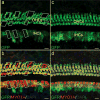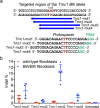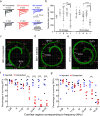Treatment of autosomal dominant hearing loss by in vivo delivery of genome editing agents
- PMID: 29258297
- PMCID: PMC5784267
- DOI: 10.1038/nature25164
Treatment of autosomal dominant hearing loss by in vivo delivery of genome editing agents
Abstract
Although genetic factors contribute to almost half of all cases of deafness, treatment options for genetic deafness are limited. We developed a genome-editing approach to target a dominantly inherited form of genetic deafness. Here we show that cationic lipid-mediated in vivo delivery of Cas9-guide RNA complexes can ameliorate hearing loss in a mouse model of human genetic deafness. We designed and validated, both in vitro and in primary fibroblasts, genome editing agents that preferentially disrupt the dominant deafness-associated allele in the Tmc1 (transmembrane channel-like gene family 1) Beethoven (Bth) mouse model, even though the mutant Tmc1Bth allele differs from the wild-type allele at only a single base pair. Injection of Cas9-guide RNA-lipid complexes targeting the Tmc1Bth allele into the cochlea of neonatal Tmc1Bth/+ mice substantially reduced progressive hearing loss. We observed higher hair cell survival rates and lower auditory brainstem response thresholds in injected ears than in uninjected ears or ears injected with control complexes that targeted an unrelated gene. Enhanced acoustic startle responses were observed among injected compared to uninjected Tmc1Bth/+ mice. These findings suggest that protein-RNA complex delivery of target gene-disrupting agents in vivo is a potential strategy for the treatment of some types of autosomal-dominant hearing loss.
Conflict of interest statement
The authors declare competing financial interests: D.R.L. is a consultant and co-founder of Editas Medicine, Beam Therapeutics, and Pairwise Plants, companies that use genome editing. The co-authors have filed patent applications on aspects of this work. Correspondence and requests for materials should be addressed to D.R.L. and Z.Y.C.
Figures













Comment in
-
Gene editing staves off deafness in mice.Nature. 2017 Dec 21;552(7685):300-301. doi: 10.1038/d41586-017-08722-3. Nature. 2017. PMID: 29293216 No abstract available.
-
An ode to gene edits that prevent deafness.Nature. 2018 Jan 11;553(7687):162-163. doi: 10.1038/d41586-017-08645-z. Nature. 2018. PMID: 29323325 No abstract available.
References
-
- Marazita ML, et al. Genetic epidemiological studies of early-onset deafness in the U.S. school-age population. Am J Med Genet. 1993;46:486–491. - PubMed
-
- Morton CC, Nance WE. Newborn hearing screening–a silent revolution. N Engl J Med. 2006;354:2151–2164. - PubMed
-
- Muller U, Barr-Gillespie PG. New treatment options for hearing loss. Nat Rev Drug Discov. 2015;14:346–365. - PubMed
Publication types
MeSH terms
Substances
Grants and funding
LinkOut - more resources
Full Text Sources
Other Literature Sources
Medical
Molecular Biology Databases

